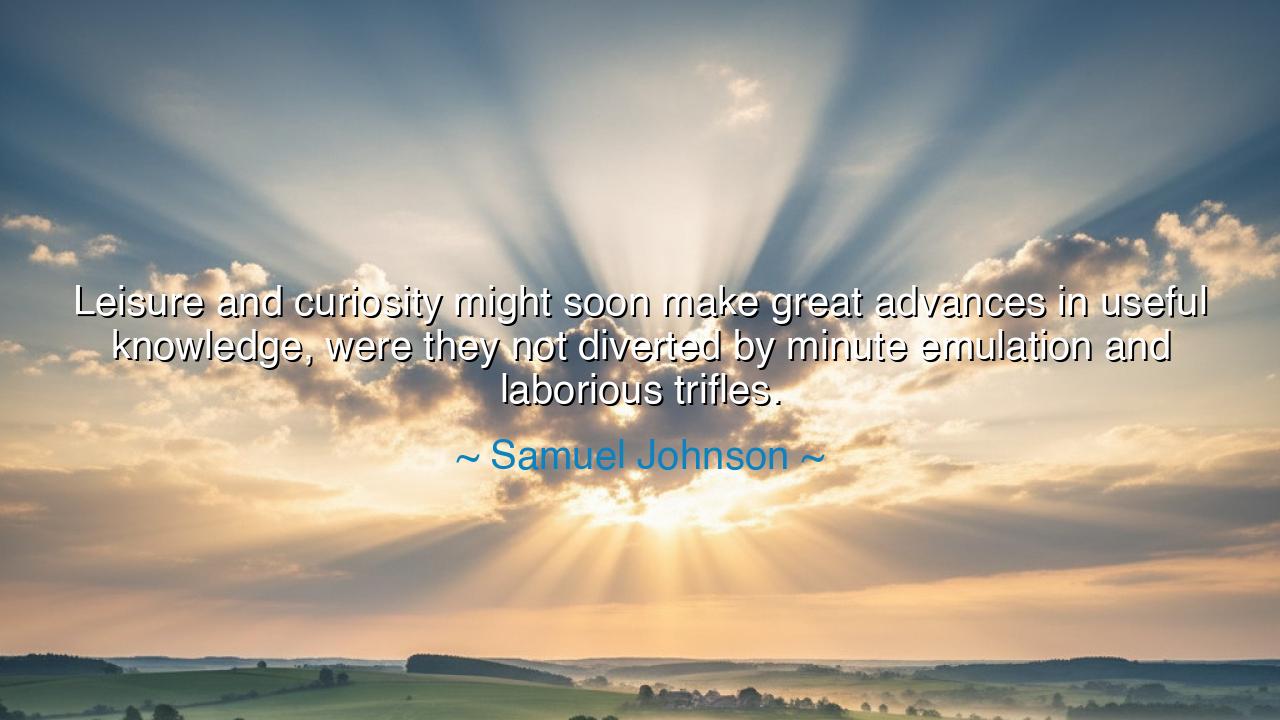
Leisure and curiosity might soon make great advances in useful
Leisure and curiosity might soon make great advances in useful knowledge, were they not diverted by minute emulation and laborious trifles.






The words of Samuel Johnson — “Leisure and curiosity might soon make great advances in useful knowledge, were they not diverted by minute emulation and laborious trifles” — fall like a gentle rebuke to every generation that has ever squandered its gifts of time and intellect. Within them lies both lament and wisdom: that the human mind, capable of uncovering the mysteries of the stars, too often loses itself in pettiness, in competition, and in the restless chase after things of no lasting worth. Johnson, the great moralist of the eighteenth century, speaks here as one who has observed the tragedy of misplaced effort — how the flame of curiosity, meant to illuminate truth, is dimmed by vanity and distraction.
In the style of the ancients, we may say: leisure is the cradle of wisdom. It is in leisure — not idleness, but the freedom to ponder, to question, to observe — that the mind grows fertile. The philosophers of old, from Aristotle to Seneca, taught that leisure was not a luxury, but a necessity for the soul. It was through quiet thought and contemplation that man approached understanding. Johnson continues this ancient lineage, warning that leisure and curiosity, those twin engines of discovery, too often perish in the pursuit of what he calls “minute emulation” — the petty rivalries and shallow contests that consume men’s energy without enriching their minds.
The origin of this quote lies in Johnson’s lifelong meditation on human behavior and moral decay. Living in an age of reason and scientific advancement, he witnessed a paradox: the more knowledge mankind acquired, the more it seemed to be fragmented, scattered among those who sought recognition rather than truth. The Age of Enlightenment promised illumination, yet Johnson saw how easily the light of inquiry could be obscured by ego. He feared that the scholar’s noble curiosity — meant to serve the world — was being wasted on “laborious trifles”, pursuits of excessive precision or shallow novelty that brought neither virtue nor meaning.
Consider the fate of Leonardo da Vinci, that giant of the Renaissance. His curiosity spanned the heavens and the earth — from anatomy to flight, from art to mathematics. Yet even Leonardo, for all his genius, was haunted by incompletion. His notebooks overflowed with sketches and designs, but so many were never realized. He was drawn, again and again, into side experiments and intricate studies that consumed his time but yielded no final fruit. Johnson’s warning might well apply to him: even genius, when scattered by trifles, can fail to bear its full harvest. It is not enough to possess curiosity; one must direct it with discipline and purpose.
Johnson’s insight also speaks to the modern age, where the trifles have multiplied a thousandfold. Leisure has been overtaken by distraction — not by noble reflection, but by the ceaseless noise of competition and vanity. We measure ourselves by shallow metrics: followers, status, possessions, or titles. Our emulation is not of virtue or wisdom, but of image. The scholar seeks reputation, not understanding; the craftsman chases novelty, not mastery. Johnson’s lament rings prophetic: when curiosity is chained to comparison, knowledge ceases to be a path to truth and becomes a performance.
Yet his words are not condemnation, but invitation. They call us to reclaim the sacred use of leisure — to make it once again the temple of thought. True leisure is not laziness; it is the cultivation of the soul’s powers without the whip of necessity or the lure of applause. To sit quietly with a question, to study not for profit but for truth, to create not for praise but for beauty — this is the kind of leisure that builds civilizations. It is what gave rise to the wisdom of Athens, the art of Florence, and the discoveries of Cambridge. It is the soil in which all progress begins.
The lesson of Johnson’s words, then, is clear and enduring: guard your curiosity as you would guard your soul. Do not let it be spent on vanity or wasted on the trivial. The mind, like a river, must not be diverted into small channels lest it lose its power to carve the great valleys of understanding. Turn away from comparison; turn toward contemplation. Seek usefulness, not approval. And when leisure blesses you with its stillness, do not fill it with noise — fill it with purposeful wonder.
So let this teaching be passed down: knowledge grows not from haste, but from harmony. Curiosity, when married to humility and guided by purpose, becomes the torch that lights the dark corners of existence. But when enslaved by pride or wasted on trifles, it burns out swiftly, leaving only smoke. Choose, then, how you will spend your precious leisure — not as a spectator of distraction, but as a pilgrim of truth. For in that sacred stillness where curiosity meets intention, the human spirit rises toward its highest form — the pursuit of useful knowledge that ennobles both mind and mankind.






AAdministratorAdministrator
Welcome, honored guests. Please leave a comment, we will respond soon